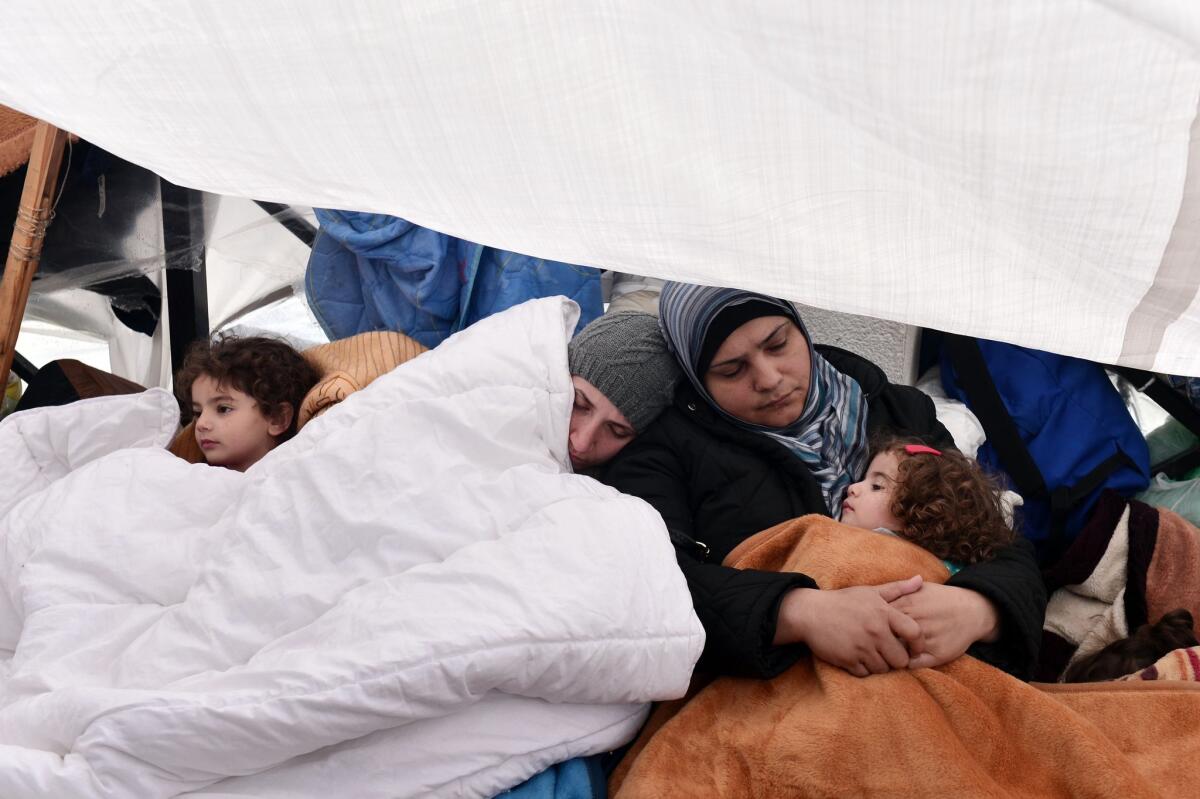U.N. relief agencies seek $16 billion to meet ‘unprecedented’ needs

- Share via
Armed conflicts driving millions to flee their homes have intensified over the last year and created an “unprecedented” refugee crisis that will require $16.4 billion to address next year, United Nations aid agencies warned Monday.
The humanitarian disaster in Syria continued to escalate this year, leaving the U.N. World Food Program with a $64-million shortfall that forced it to suspend a rationing program last week for 1.7 million of the displaced living in neighboring countries.
Syria, South Sudan, Iraq and the Central African Republic, all consumed by intractable battles, account for 70% of the relief demands placed on the international community, the U.N. Office for the Coordination of Humanitarian Affairs said in launching its appeal for 2015.
This year also saw new demands on the U.N. refugee agency from half a million Ukrainians forced to flee their homes as Russia-backed separatists fought government troops in a battle for territory in the troubled country’s eastern regions.
“The rising scale of need is outpacing our capacity to respond,” Valerie Amos, U.N. undersecretary for humanitarian affairs and emergency relief, said at a news conference in Geneva.
Worldwide, about 102 million people are in need of aid, with 57.5 million of them considered especially at risk in 22 countries, Amos said.
“Over 80% of those we intend to help are in countries mired in conflict where brutality and violence have had a devastating impact on their lives,” she said.
In addition to the most pressing aid needs, the appeal for funds covers planned relief for Afghanistan, the Democratic Republic of Congo, Myanmar, the occupied Palestinian territories, Somalia and Yemen, the Office of the U.N. High Commissioner for Refugees reported.
“This is not business as usual in the humanitarian world,” said Antonio Guterres, the refugee agency commissioner. “Today’s needs are at unprecedented levels, and without more support there simply is no way to respond to the humanitarian situations we’re seeing in region after region and in conflict after conflict.”
The dire situation for Syrian refugees and millions more internally displaced by the nearly 4-year-old civil war prompted Amnesty International to appeal to the world’s wealthier countries to take in more of those who have been holed up in refugee camps in neighboring countries.
Five Middle East countries -- Turkey, Lebanon, Jordan, Iraq and Egypt -- host more than 98% of the 4 million Syrians who have fled their country to escape the bombardment and bloodletting, Amnesty International noted in a report titled “Left Out in the Cold.”
The 28 countries of the European Union, most vastly better off than the Syrian neighbors bearing the brunt of the refugee crisis, have collectively taken in about 150,000 Syrian refugees, Amnesty reported. The rights group said that figure compares with a single week’s influx into Turkey in September, when Syrians fled the advance of the extremist group Islamic State into a northwestern town.
“The international community has largely stood on the sidelines, promising support to Syrians and countries hosting them but, in reality, delivering little,” the Amnesty report says.
Amnesty reminded global powers of their obligations to share the burdens of humanitarian crises under the U.N. Charter and the 1951 Refugee Convention.
In addition to appealing to Europe and North America, Amnesty targeted the wealthy Persian Gulf states for criticism.
“The complete absence of resettlement pledges from the gulf is particularly shameful,” the report says. “Linguistic and religious ties should place the gulf states at the forefront of those offering safe shelter to refugees fleeing persecution and war crimes in Syria.”
Rebel forces opposed to the rule of Syrian President Bashar Assad rose up against his authoritarian rule in early 2011, in a conflict that has drawn in extremist groups such as Islamic State, which now controls about a third of the country’s territory.
The United Nations estimates that at least 191,000 Syrians have been killed in the conflict.
Follow @cjwilliamslat for the latest international news 24/7
More to Read
Sign up for Essential California
The most important California stories and recommendations in your inbox every morning.
You may occasionally receive promotional content from the Los Angeles Times.











